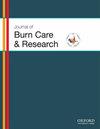Fighting A New Front On An Old Battlefield: Examining the Development of Topical Antimicrobial Care to Control Burn Wound Sepsis
IF 1.5
4区 医学
Q3 CRITICAL CARE MEDICINE
引用次数: 0
Abstract
Recognition of invasive burn wound sepsis as a major cause of morbidity and mortality in burn injured patients has profoundly changed the management of burn wounds and its associated complications. The development of effective topical antimicrobial therapy is one of the last major developments of modern burn care and has been driven by major world events and scientific breakthroughs. Topical antimicrobial burn care has evolved from the use of anecdotal remedies to scientific breakthroughs such as Moyer’s successful dilution of silver nitrate solution, Fox’s described benefit of silver sulfadiazine use in animal models, and Pruitt’s dramatic improvement in post-burn mortality using topical mafenide acetate in burn wounds. The objective of this manuscript is to review the definition of burn wound sepsis and highlight the major developments and breakthroughs in topical burn wound care throughout history. This includes historical events like major wars or domestic fires that have influenced or impacted the understanding and treatment of burn wounds. Newer advances in topical antimicrobial care such as nanosilvers and dressing technologies that improve the morbidity and mortality associated with burn wound sepsis and novel approaches to management will also be discussed. To improve burn care, it is prudent to look to the past and learn from the experiences of those who contributed to the control of burn wound sepsis.在老战场上开辟新战线:研究开发局部抗菌护理以控制烧伤伤口败血症
人们认识到侵袭性烧伤创面败血症是烧伤患者发病和死亡的主要原因,这深刻地改变了烧伤创面及其相关并发症的治疗方法。有效的局部抗菌疗法的发展是现代烧伤护理的最后一项重大进展,它是由重大世界事件和科学突破推动的。烧伤局部抗菌治疗已从使用轶事疗法发展到科学突破,例如莫耶成功稀释硝酸银溶液、福克斯描述了在动物模型中使用磺胺嘧啶银的益处,以及普鲁伊特在烧伤创面中使用醋酸马芬尼特局部外用药显著改善了烧伤后死亡率。本手稿旨在回顾烧伤创面败血症的定义,并重点介绍烧伤创面局部护理历史上的重大进展和突破。其中包括影响或冲击人们对烧伤创面的理解和治疗的重大战争或国内火灾等历史事件。此外,还将讨论局部抗菌护理方面的最新进展,如纳米硅剂和敷料技术,这些技术可改善与烧伤创面败血症相关的发病率和死亡率,以及新的治疗方法。为了改善烧伤护理,我们应该回顾过去,学习那些为控制烧伤创面败血症做出贡献的人的经验。
本文章由计算机程序翻译,如有差异,请以英文原文为准。
求助全文
约1分钟内获得全文
求助全文
来源期刊
CiteScore
2.60
自引率
21.40%
发文量
535
审稿时长
4-8 weeks
期刊介绍:
Journal of Burn Care & Research provides the latest information on advances in burn prevention, research, education, delivery of acute care, and research to all members of the burn care team. As the official publication of the American Burn Association, this is the only U.S. journal devoted exclusively to the treatment and research of patients with burns. Original, peer-reviewed articles present the latest information on surgical procedures, acute care, reconstruction, burn prevention, and research and education. Other topics include physical therapy/occupational therapy, nutrition, current events in the evolving healthcare debate, and reports on the newest computer software for diagnostics and treatment. The Journal serves all burn care specialists, from physicians, nurses, and physical and occupational therapists to psychologists, counselors, and researchers.

 求助内容:
求助内容: 应助结果提醒方式:
应助结果提醒方式:


